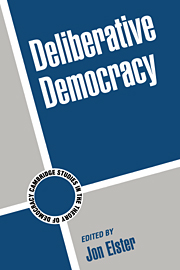
-
Select format
-
- Publisher:
- Cambridge University Press
- Publication date:
- 05 June 2012
- 28 March 1998
- ISBN:
- 9781139175005
- 9780521592963
- 9780521596961
- Dimensions:
- (228 x 152 mm)
- Weight & Pages:
- 0.585kg, 296 Pages
- Dimensions:
- (228 x 152 mm)
- Weight & Pages:
- 0.391kg, 296 Pages
You may already have access via personal or institutional login- Series:
- Cambridge Studies in the Theory of Democracy (1)
Book description
It is sometimes assumed that voting is the central mechanism for political decision-making. The contributors to this volume focus on an alternative mechanism, that is decision by discussion or deliberation. The original contributions include case studies based on historical and current instances of deliberative democracy, normative discussion of the merits of deliberation compared to other models of collective decision-making, and studies of the conditions under which it tends to improve the quality of decisions. This volume is characterized by a realistic approach to the issue of deliberative democracy. Rather than assuming that deliberative democracy is always ideal, the authors critically probe its limits and weaknesses as well as its strengths.
Reviews
"Deliberative Democracy is a timely book by an excellent group of scholars that examines an issue of major political importance: the merits of decision making by deliberation. Everyone interested in democratic theory and practice should read this far-ranging, thoughtful, and provocative collection." Amy Gutmann, Princeton University
"This thoughtful and engaging volume makes several significant contributions to our understanding of democratic deliberation. Deliberative Democracy's major insights involve the questions and challenges that it raises for our basic conceptions of deliberation and democratic decision-making. These essays place a number of important issues on the research agenda in this field." Jack Knight, Washington University in St. Louis
Contents
Metrics
Altmetric attention score
Full text views
Full text views help Loading metrics...
Loading metrics...
* Views captured on Cambridge Core between #date#. This data will be updated every 24 hours.
Usage data cannot currently be displayed.
Accessibility standard: Unknown
Why this information is here
This section outlines the accessibility features of this content - including support for screen readers, full keyboard navigation and high-contrast display options. This may not be relevant for you.
Accessibility Information
Accessibility compliance for the PDF of this book is currently unknown and may be updated in the future.


